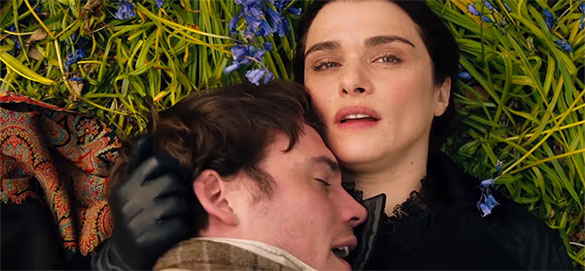My Cousin Rachel ****

Daphne du Maurier novels are primed for screen use – just take Rebecca, The Birds and Don’t Look Now, for example. After all, she was a master of intrigue, dark imagination, and open endings, and was one of Hitchcock’s favourites to adapt. Hence, the second big-screen incarnation of My Cousin Rachel (the first made in 1952, starring Olivia de Havillard and a young Richard Burton) ought to be an enticing affair, starring Rachel Weisz this time around. It is, and just as moody in production as in acting as any ‘period film noir’ should be. It also retains the mystery right up until the very last frame, which some might find utterly frustrating.
After the sudden death of his beloved cousin/father figure in Italy, young Englishman Philip (Sam Claflin) begins to plot revenge against his cousin’s widow, the enigmatic and beautiful Rachel (Weisz), believing foul play at his cousin’s demise. He waits for Rachel’s imminent arrival, after news that she is to settle in England on her husband’s estate – which Philip has been running and will inherit at on his 25th birthday. However, the more Philip gets to know her, the more he falls for her charm and individuality. But what are Rachel’s real intentions?
The ‘did she, didn’t she’ yarn is engrossing enough to have you hooked throughout and continually looking for clues to solve the mystery. At the same time, it almost makes excuses for some of the lesser explained sub plots that writer-director Roger Michell leaves ‘hanging’. Perhaps, this whole mystery works because both Michell and his leads did not discuss who is to blame throughout filming? This certainly translates onto screen, as all the characters have is to react to the present situation they find themselves in, while they (and we) try working out what the devil is going on?
My Cousin Rachel cleverly swings between sympathy with and suspicion of Rachel, partly due to the great acting talents of Weisz – without her, this film might have been a non-starter. Weisz delivers just the right amount of torment and teasing, composure and melodramatics to keep you guessing, playing the full spectrum of emotion. She is entrancing to watch even when she says nothing, dressed in mournful black most of the time, like some ever-present dark menace in the room, even in her lighter moments.
Michell does make full use of the Rael Jones music score to prompt changes in mood perhaps a little too frequently, but Claflin’s ‘lesser acting experience’ compared to Weisz’s actually plays to his character’s advantage in dealing with the more worldly-wise woman. Claflin says he did not know what Weisz’s next move would be on set and this certainly shines through.
The actual surprise for those fans of Austen and Dickens-adapted films is the modern vein of humour coursing through it, even the language that My Cousin Rachel employs – cue the moment Philip’s butler deals with men wrongly dressing the Christmas tree. This is a feature of du Maurier’s written word which Michell has captured well, and it feels quite in place and ‘fresh’, punctuating languishing moments in such a period drama, even though the time’s decorum is still maintained.
Game of Thrones’ star Iain Glen and Holliday Grainger are brilliant support to Claflin’s Philip as the Kendalls (father and daughter), who worry about his position and mental health. As onscreen mentors and wiser figures, even they are susceptible to Rachel’s lure, making for an intriguing dynamic.
My Cousin Rachel is a curious one to describe to those who haven’t seen it. It creeps up on you slowly and makes you think before frustrating the hell out of you in the end. It has love, mystery, drama and comedy, without all the stuffiness of period drama that might turn some off. It is a period ‘coming-of-age’ film too, where the ‘bad guy’ is female – or is she? Is she just very independent and sexually liberated for her time? As Philip asks in the end: who is to blame? Perhaps, that’s where du Maurier’s opening line in the novel might help: “They used to hang men at Four Turnings in the old days”… You decide.
4/5 stars
By @Filmgazer